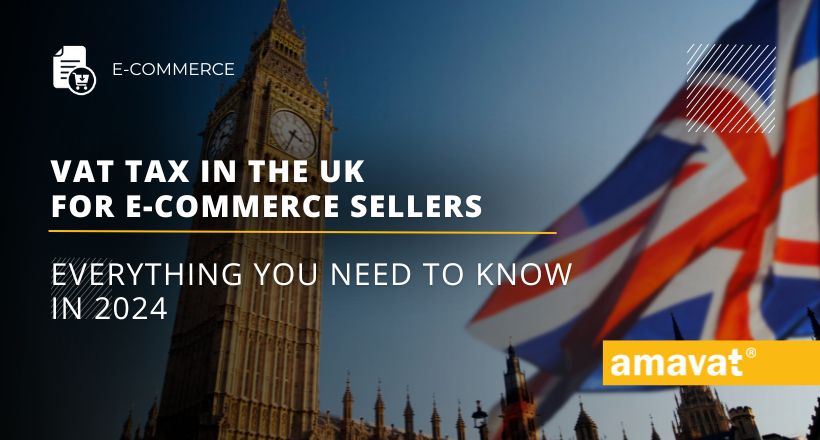VAT tax in the UK for e-commerce sellers: Everything you need to know in 2024
Since Brexit in 2020, the United Kingdom has become an arena of new challenges for e-commerce entrepreneurs, especially concerning VAT tax. Changes in the trading system, the introduction of new import and export rules, and various VAT rates require special attention from online sellers. In this article, we will discuss all the essential aspects related to VAT tax in the UK.
VAT rates in the UK
There are three main VAT rates in the UK:
- Standard Rate (20%): Applies to most goods and services.
- Reduced Rate (5%): Applies to specific products and services, such as certain healthcare products, fuel, heating, and child car seats.
- Zero Rate (0%): Includes most food products, books, and children’s clothing. Despite being exempt from taxation, selling products in this category still requires reporting on VAT return forms.
VAT registration in the UK
VAT registration in the UK is mandatory for businesses engaging in taxable transactions but not based in the country. You must register before you start trading to avoid legal consequences and ensure compliance with regulations. Registration can be done by submitting a paper or electronic application through the HMRC portal.
More information on VAT registration in the UK can be found in our article: https://amavat.eu/uk-vat-registration/.
Transactions requiring VAT registration in the UK
Below are some examples of transactions that require registration in the UK for VAT taxation purposes:
- Importing goods into the UK.
- Exporting goods from the UK.
- Storing goods in the UK and then selling them.
- Purchasing goods and then selling them within the UK (local trade).
- Selling B2C goods to the UK valued at or below 135 GBP (transactions above this amount are treated as exports to the UK and do not require a UK VAT number).
- Selling goods in the UK through marketplaces (e.g., Amazon), using the fullfilment model.
Payment of UK VAT tax
After registering for VAT in the UK, entrepreneurs have various payment options, such as the Standard Accounting Scheme, Cash Accounting Scheme, Annual Accounting Scheme, and VAT Flat Rate Scheme. The choice of the appropriate scheme depends on individual needs and the nature of the business.
- Standard Accounting Scheme: Involves registering and accounting for VAT based on the invoice issuance date. Entrepreneurs using this system submit quarterly VAT returns and receive refunds quarterly as well. This option is mandatory for businesses with an annual turnover exceeding 1,350,000 GBP.
- Cash Accounting Scheme: Involves registering and accounting for income when received, with expenses recorded in the period they are incurred. This system is designed for businesses with an annual turnover not exceeding 1,350,000 GBP.
- Annual Accounting Scheme: Allows for prepayment of VAT as a deposit, followed by submission of a single annual declaration. Payment can be made in installments. This model is intended for businesses with an annual turnover not exceeding 1,350,000 GBP.
- VAT Flat Rate Scheme: Allows for paying a fixed VAT rate to HMRC, then retaining VAT charged to customers. This system is available for businesses with a net annual turnover not exceeding 150,000 GBP.
Filing VAT declarations in the UK – Deadlines, penalties, and interest
VAT declaration deadlines in the UK vary depending on the schedule set after registration by HMRC. However, VAT declarations are generally submitted every three months. It is required to file declarations using the HMRC online system within one month and seven days after the end of the accounting period.
It should be noted that VAT taxpayers are also required to file declarations even if there is no activity to avoid potential penalties. In the UK, VAT reporting is done digitally through the Making Tax Digital (MTD) for VAT system, which is equivalent to the Polish Unified Control File.
If a VAT taxpayer fails to meet the VAT returns deadlines, they risk being charged interest or being subject to penalties by the UK Tax Office. Penalties may include, among others, imposing a monetary penalty equivalent to the total VAT due in the period when the taxpayer was not registered. Delays or deficiencies in VAT declarations may result in penalties of up to 15% of the unpaid tax, as well as penalties for inaccurate or incorrect returns, which can amount to up to 100% of lost revenue.
Selling through Amazon in the UK: VAT tax issues
When sending goods to Amazon warehouses in the UK and reselling them directly to customers, it is necessary to register for VAT to import goods under a British VAT number.
For B2C shipments valued below 135 GBP, the British government has introduced simplifications. Import VAT is no longer collected upon crossing the border but must be charged by the seller at the time of sale. For customers registered for VAT in the UK, reverse charge may also apply.
When the recipient of the goods is a company registered for VAT in the UK, the seller is required to declare such sales in the VAT return. In the case of B2C sales through Amazon, the marketplace usually collects VAT on behalf of sellers.
Intrastat in the UK
After leaving the EU, trade between the UK and the EU no longer requires Intrastat reporting, except for trade with Northern Ireland, which remains subject to these requirements. Export and import with Northern Ireland must be reported as part of Intrastat reporting using the country code XI.
British VAT invoices
British sales invoices should contain the following information:
- Seller’s details: name, address, VAT number
- Buyer’s details: name, address, VAT number
- Invoice number
- Date of issue
- Date of delivery
- Itemization: Description of goods supplied, quantity/weight
- Itemization: Net amount, VAT amount, gross amount
- Applied VAT rate
- Annotation in case of applying the 0% VAT rate containing information on VAT exemption provisions (along with directive number), if applicable
- Annotation in case of applying reverse charge containing information on provisions regarding VAT exemption (along with directive number), if applicable
- Currency in which the invoice was issued
Summary
VAT tax in the UK for e-commerce sellers is a topic that requires special attention in light of Brexit-related changes and new regulations regarding trade. In this article, we discussed key aspects related to UK VAT tax, such as tax rates, VAT registration, types of transactions requiring registration, VAT payment options, and VAT declaration deadlines. Additionally, we examined issues related to selling through Amazon in the UK and reporting trade between the UK and the EU. By understanding these issues, e-commerce entrepreneurs will be able to effectively manage their online sales activities in the UK and avoid potential legal consequences related to non-compliance with tax regulations.
For questions or additional information, feel free to contact our team of experts, ready to provide assistance and support: Contact us – amavat®.



